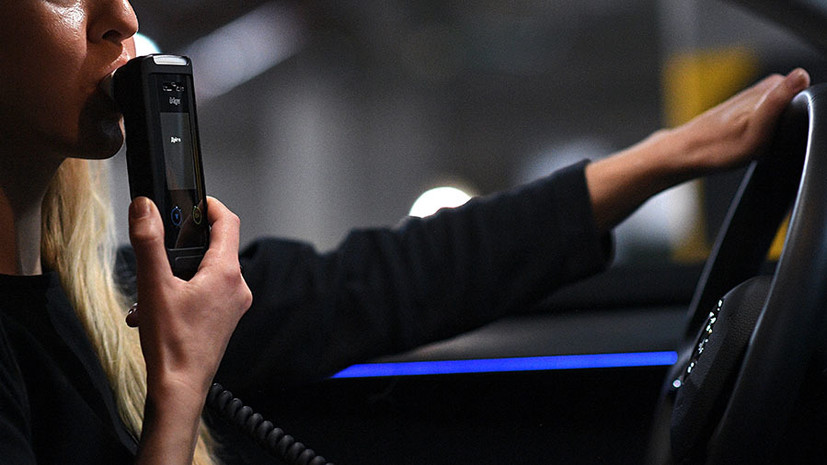The Ministry of Industry and Trade, together with the State Traffic Safety Inspectorate, is discussing the idea of equipping cars with alcohol locks for those drivers who were involved in drunk driving.
As the deputy head of the Ministry of Industry and Trade Vasily Shpak said at the exhibition "Intelligence of Machines and Mechanisms", we are talking about the forced equipping of the car with a special device at the expense of the offender.
An alcohol lock is a device that prevents the engine from starting without the driver passing identification and a sobriety test using the breathalyzer included in the system.
“We say with the traffic police that if, for example, a violator is to change the rules so that all his cars, which he drives, are forcibly equipped with an alcohol lock at his expense.
Once you have already been caught, if you want to drive again, put an alcohol lock, and then each of your trips must be accompanied by a confirmation, ”RIA Novosti quotes Shpak.
It is assumed that the alco lock will work in conjunction with the GLONASS system in order to transmit data about the driver, as well as monitor the health of the mechanism.
The deputy minister believes that taxis and car-sharing companies may have a high demand for alcohol locks.
Shpak noted that some transport leaseholders are not always ready to get behind the wheel.
He also mentioned the practice of using fake accounts.
“Including people using fake accounts take cars: they register them not for themselves, but for someone, which also does not exclude the possibility of using it for the wrong purposes.
And here this issue is being resolved.
If the person is not the one who actually got behind the wheel and is identified from the photo, he will not be able to drive him.
Accordingly, if this person is drunk, he will not be able to manage either, ”the deputy minister explained.
Also on russian.rt.com Volodin noted the need for additional measures to combat reckless drivers
Shpak noted that we are talking about alcolocks of domestic design with their own software and component base, which make it possible to identify the driver.
According to the deputy minister, locks are used abroad, in particular in the United States, for which it is enough to pass an alcohol test - such a system does not take into account who exactly gets behind the wheel.
As the "Rossiyskaya Gazeta" wrote, an experiment on the installation of alkozamkov was carried out in 2010 in Tatarstan, as well as in the Moscow and Ivanovo regions.
According to the newspaper, the locks were installed on school buses, and subsequently the experiment was recognized as successful.
In the summer of 2020, the media reported that the Ministry of Industry and Trade was preparing a concept for the mass introduction of alkozamoks.
As the newspaper "Kommersant" wrote, the department held a meeting with potential developers of such devices.
At the time of publication, the publication estimated the likely cost of equipping a car with an alco lock at 25-120 thousand rubles.
Commenting on the prospect of compulsory installation of alcohol locks on the cars of drivers caught driving while drunk, Igor Morzharetto, partner of the analytical agency Avtostat, noted the widespread use of this concept in the world.
“This idea has already been worked out in many countries.
We are adopting interesting experience.
For example, in Sweden, Estonia and many other countries such a practice exists.
If the driver is caught for driving while intoxicated and the excess in per mil is small, he is offered, as an alternative to deprivation of rights, just a serious fine and the installation of an alcohol lock.
Moreover, the alkozamok is set for its own money, "the expert said in an interview with RT.
Morgaretto also said that in addition to installing the lock itself, the driver will need to pay for the monthly maintenance of the device.
During the use of the alco lock, the driver is “blown through” each time before starting the engine.
At the same time, the expert doubted that in the case of car sharing, the idea of installing alcolocks would be attractive.
“The fact is that this is expensive equipment, and it will immediately increase the cost of the service,” said the interlocutor of RT.
Note that in September 2020, the Secretary of the Security Council of the Russian Federation Nikolai Patrushev called for the introduction of technological solutions in the country that would not allow drunk people to get behind the wheel.
Patrushev noted that accidents committed by drivers in a state of alcoholic and drug intoxication receive an increasing public response.
We add that in March a draft federal law on the confiscation of cars from drunk drivers was submitted to the State Duma.
The parliamentarians proposed to introduce such a measure in relation to persons who, for the second time in a year, come across drunk while driving or who become the culprit of an accident with grave consequences.

